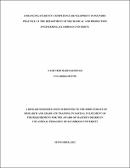| dc.description.abstract | The study aimed to explore strategies for enhancing students’ competence development in foundry practice at the Department of Mechanical and Production Engineering (DMPE), Kyambogo University. The study was premised on the theory of participation and reflections that guarantee competence development in foundry work. The study was guided by four specific objectives; examine gaps hindering students’ competence development in foundry practice, identify interventions, implement the identified interventions and lastly evaluate the implemented interventions aimed at enhancing students’ competence development in foundry practice at DMPE. A Participatory Action Research (PAR) design was used to carry out the study using qualitative methods of descriptive data collection that included; work process analysis, Focus Group Discussions (FGDs), future workshops, interviews, observation, and documentary analysis. The purposive sampling technique was used to select the respondents who included DMPE administrators, foundry technology teaching staff, and students. The analysis of the process of teaching foundry technology practical work revealed more emphasis on theory than practice inappropriate method of assessment, and inadequate training facilities and equipment, as the most significant gaps that needed to be addressed. To address the gaps, the following intervention strategies were used: Group learning method and advocating for accessibility to the DMPE workshop. The evaluation findings of this study revealed that group learning enabled students to acquire confidence and immediate feedback in foundry practice. In conclusion, active participation in foundry practical work through trying and failing and trying again increases students’ competencies. Recommendations are that display boards should be constructed to display sound patterns in addition to using small manageable groups during practical sessions and assessing the foundry process rather than the final product. | en_US |

